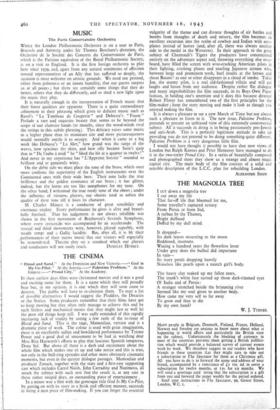THE CINEMA
"Blood and Sand." At the Dominion and New Victoria. " God is My Co-Pilot." At the Astoria.—" Palestine Problem." At the Empire.—" Proud City." At the Academy.
IN their earliest days films were christened movies and it was a good and exciting name for them. It is a name which they still proudly bear but, in my opinion, it is one which they will soon cease to deserve. The public will have to re-christen them. To start a list of possible alternatives I would suggest the Ploddies, the Drearies or the Statics. Some producers remember that their films have got to keep moving but they often only manage to achieve this end by such lifeless and mechanical means that they might just as well let the poor old things keep still. I was sadly reminded of this rapidly increasing lack of vitality by seeing a few reels of the re-issue of Blood and Sand. This is the 1941, Mamoulian, version and is a dramatic piece of work. The colour is used with great imagination, there is an excellently sullen and bewildered performance by Tyrone Power and a good deal of amusement to be had in watching dear Miss Rita Hayworth's efforts to play that luscious Spanish temptress, Dona Sol. But above all there is a dash and excitement about the whole film which makes one sit up and take notice and this is true, not only in the bull-ring episodes and other more obviously cinematic moments, but even in the quieter dialogue passages. Mamoufian and producer Zanuck, together with the stars and a first-rate supporting cast which includes Carrol Naish, John Carradine and Nazimova, all attack the subject with such zest that the result is, at any rate in these rather insipid days, an outstanding piece of entertainment .
In a minor way a film with the grotesque title God Is My Co-Pilot, by getting on with its story in a brisk and efficient manner, succeeds in being a neat piece of film-making. If you can forget the essential vulgarity of the theme and can divorce thoughts of air battles and bombs from thoughts of death and misery, the film becomes an excellent excursion into the realm of cowboy and Indian with aero- planes instead of horses (and, after all, there was always another side to the medal in the Westerns). In their approach to the great subject of Chennault's Tigers the producers have concentrated entirely on the adventure aspect and, throwing everything else Over- board, have filled the screen with wise-cracking American pilots in their fighting, crashing planes and snarling Japanese airmen who, between large and prominent teeth, hurl insults at the heroes and shout Banzai! as one or other disappears in a cloud of smoke. Tokio Joe, the enemy pilot, is a real old-fashioned villain and will get laughs and hisses from any audience. Despite rather flat dialogue and many improbabilities the film succeeds, in its Boys Own Paper fashion, in holding one's attention and it does this because director Robert Florey has remembered two of the first principles for the film-maker • keep the story moving and make it look as though you enjoyed making the film.
It is always a pleasure to see a new March of Time but not always such a pleasure to listen to it. The new issue, Palestine Problem, pretends to present an unbiased view of this extremely controversial subject. All it succeeds in doing is in being passionately pro-Jewish and anti-Arab. This is a perfectly legitimate attitude to take up providing you do not pretend to be doing something quite different. Palestine Problem is a very dangerous little film.
I would not have thought it possible to have shot new views of London but Ralph Keenes and Peter Hennessy have managed to do it in the two-reeler Proud City. In a series of beautifully composed and photographed shots they show us a strange and almost magic capital city. The main body of the film consists of a solid and sensible description of the L.C.C. plan for rebuilding London.
ALEXANDER SHAW.






























 Previous page
Previous page